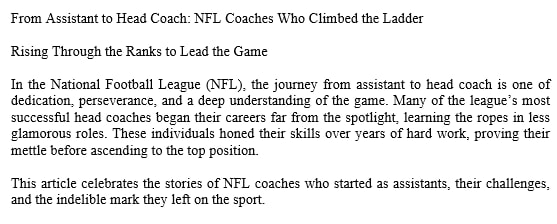From Assistant to Head Coach: NFL Coaches Who Climbed the Ladder

From Assistant to Head Coach: NFL Coaches Who Climbed the Ladder
Rising Through the Ranks to Lead the Game
In the National Football League (NFL), the journey from assistant to head coach is one of dedication, perseverance, and a deep understanding of the game. Many of the league’s most successful head coaches began their careers far from the spotlight, learning the ropes in less glamorous roles. These individuals honed their skills over years of hard work, proving their mettle before ascending to the top position.
This article celebrates the stories of NFL coaches who started as assistants, their challenges, and the indelible mark they left on the sport.
The Path to Leadership
The path to becoming an NFL head coach is rarely linear. Many start as position coaches, coordinators, or even interns, working tirelessly to gain experience. It is a journey that tests their patience, knowledge, and ability to lead. For these coaches, the climb up the professional ladder is more than a career, it is a testament to their passion for the sport and their belief in the power of teamwork.
Bill Belichick: The Mastermind in the Making
Bill Belichick’s career exemplifies the climb from assistant to head coach. His journey began as a special assistant for the Baltimore Colts in 1975, followed by stints with several teams in various roles, including defensive coordinator for the New York Giants under Bill Parcells.
Belichick’s time as an assistant was marked by meticulous preparation and a keen eye for strategy. When he became the head coach of the New England Patriots, he applied the lessons learned during his years as an assistant, building a dynasty that won six Super Bowl titles. His success highlights the value of learning every aspect of the game before taking the reins.
Tony Dungy: A Calm and Steady Leader
Tony Dungy’s rise to prominence began as a defensive backs coach for the Pittsburgh Steelers. Known for his calm demeanour and methodical approach, Dungy worked his way up to defensive coordinator before being offered the head coaching job with the Tampa Bay Buccaneers.
Dungy’s ability to build strong, disciplined teams led to his historic Super Bowl victory with the Indianapolis Colts in 2007, making him the first Black head coach to achieve this feat. His journey underscores the importance of staying true to one’s principles while climbing the coaching ladder.
Andy Reid: A Commitment to Growth
Before becoming one of the most respected head coaches in NFL history, Andy Reid started as an offensive assistant with the Green Bay Packers. Reid’s ability to develop players and innovate offensive strategies earned him a promotion to head coach of the Philadelphia Eagles in 1999.
After years of success in Philadelphia, Reid joined the Kansas City Chiefs, where he has cemented his legacy with multiple Super Bowl appearances and a championship victory. Reid’s story is one of continuous improvement and adaptability, qualities essential for anyone aspiring to lead at the highest level.
Mike Tomlin: From Coordinator to Champion
Mike Tomlin’s coaching journey began as a wide receivers coach at the collegiate level before transitioning to the NFL as a defensive backs coach. His rise was swift, becoming the defensive coordinator for the Minnesota Vikings and later the head coach of the Pittsburgh Steelers.
At 36, Tomlin became one of the youngest head coaches to win a Super Bowl, achieving the feat in 2009. His ability to connect with players and foster a winning culture is a testament to his leadership skills and the lessons learned as an assistant.
Sean McVay: A Modern Coaching Prodigy
Sean McVay’s rapid ascent in the NFL coaching ranks is nothing short of remarkable. Starting as an offensive assistant with the Tampa Bay Buccaneers, McVay quickly made a name for himself as a brilliant strategist.
At just 30 years old, he was named head coach of the Los Angeles Rams, becoming the youngest head coach in modern NFL history. McVay led the Rams to a Super Bowl victory in 2022, showcasing how innovative thinking and a solid foundation as an assistant can propel one to extraordinary success.
The Challenges of Climbing the Ladder
The transition from assistant to head coach is fraught with challenges. Assistants often focus on specific aspects of the game, whereas head coaches must oversee all facets of team management, including personnel decisions, game planning, and motivating players.
Additionally, the pressure to deliver results in a high-stakes environment can be overwhelming. However, those who succeed in this transition demonstrate exceptional resilience, adaptability, and a profound understanding of football.
Qualities That Define Successful NFL Coaches
• Work Ethic: Successful coaches often put in long hours, meticulously studying game film and preparing strategies.
• Adaptability: The ability to adjust tactics based on the opponent or game situation is crucial.
• Communication: Effective communication with players, staff, and the media is essential for building trust and maintaining team cohesion.
• Leadership: Inspiring players and fostering a positive culture are hallmarks of great head coaches.
Lessons from the Journey
The stories of NFL coaches who rose through the ranks serve as inspiration not only for aspiring coaches but for anyone pursuing their dreams. Their journeys highlight the importance of patience, continuous learning, and unwavering dedication.
These coaches remind us that success is rarely instantaneous; it is the result of years of hard work, perseverance, and a deep love for what you do. In the NFL, as in life, the climb may be steep, but the view from the top is worth every step.
Source link
